“A Private Little War”
Written by Jud Crucis and Gene Roddenberry
Directed by Marc Daniels
Season 2, Episode 16
Production episode 60345
Original air date: February 2, 1968
Stardate: 4211.4
Captain’s log. The Enterprise has arrived at Neural. Kirk led a planetary survey to the world as a lieutenant thirteen years ago, and he, Spock, and McCoy have beamed down to examine the local flora, which has many spiffy medicinal properties. Spock sees the footprints of a bear-like creature known as the mugato.
Kirk and Spock see three dark-haired locals with flintlock rifles, which surprises Kirk, since the last time he was here, they were a peaceful people whose only weapons were bows and arrows. He also sees four other white-haired locals—including his friend from the last time, Tyree—walking into an ambush. Kirk throws a rock to distract the rifle carriers, but then they give chase. McCoy hears the commotion and calls the Enterprise, but before they can be beamed back up, Spock is shot.
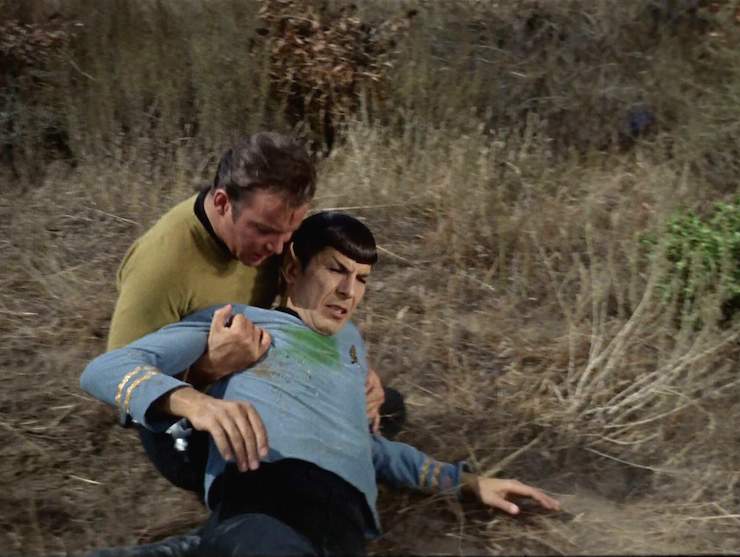
McCoy, Chapel, and Dr. M’Benga work on Spock in the transporter room, unable to even wait to get him to sickbay. And then the ship goes to red alert—Uhura reports a Klingon ship in orbit. Kirk and Scotty rush to the bridge, where Chekov reports that they moved to the other side of the planet, and Uhura picked up a routine transmission from the Klingon ship that makes no mention of the Enterprise, so they’re safe for now.
Kirk downgrades to yellow alert and orders Chekov to keep the planet between them and the Klingons. The bridge crew speculates madly about how they went from bows and arrows to flintlocks in thirteen years rather than the twelve centuries it took humans.
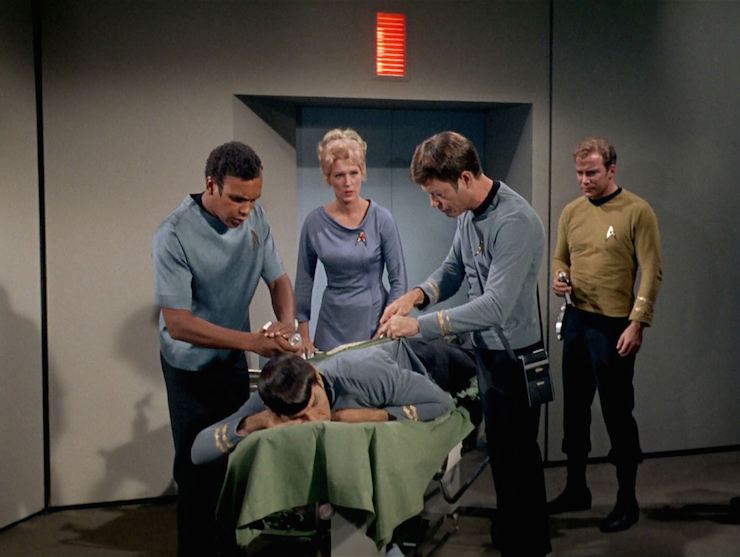
McCoy reports to Kirk that Spock needs to heal himself at this point. M’Benga interned in a Vulcan ward, so Kirk can leave Spock under his care while McCoy beams back down with Kirk. McCoy can determine if the Klingons are there for the same reason the Federation was: to use the native flora for medicinal purposes. But if the Klingons have violated the treaty, Kirk needs someone there he trusts as much as he trusts Spock.
Changing into native clothing, they beam down, when they are immediately attacked by a mugato. McCoy manages to hit it with a phaser, but Kirk is bitten—and the mugato bite is poisonous. Unfortunately, the Enterprise is out of range in order to keep hidden from the Klingons. McCoy can keep Kirk stable for a while, but he has no cure.
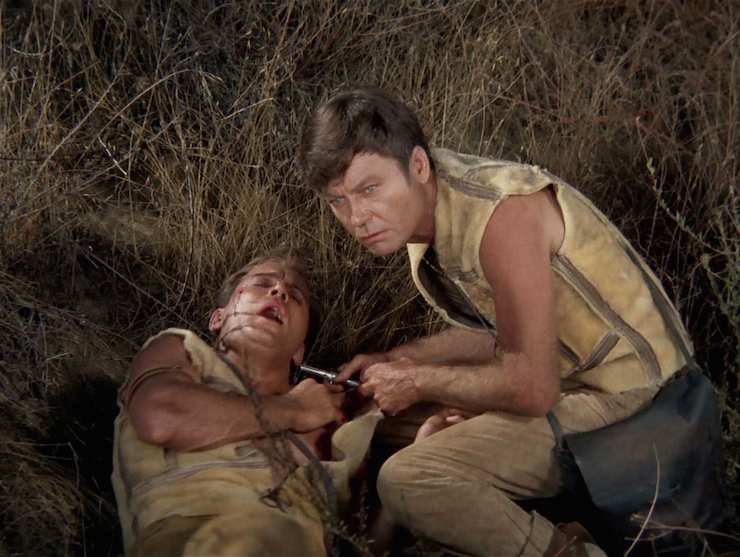
They’re found by several of Tyree’s people, and before going unconscious, Kirk says Tyree has a cure. They’re escorted to the encampment, where McCoy keeps him warm in furs and by using his phaser to heat a few rocks until Tyree—who is now the leader of the hill people—returns.
For his part, Tyree and his wife Nona observe the villagers with their “firesticks.” Nona thinks they should obtain such weapons, so they can fight back. But Tyree is optimistic that the villagers will return to their friendly ways. They talk in exposition for a bit, Tyree half-joking that she put a spell on him to make him marry her, her saying that as a kahn-ut-tu woman, men seek women like her to gain power. In truth, she used a local plant as a “love potion,” and she gives him some now to make him lustful for her.
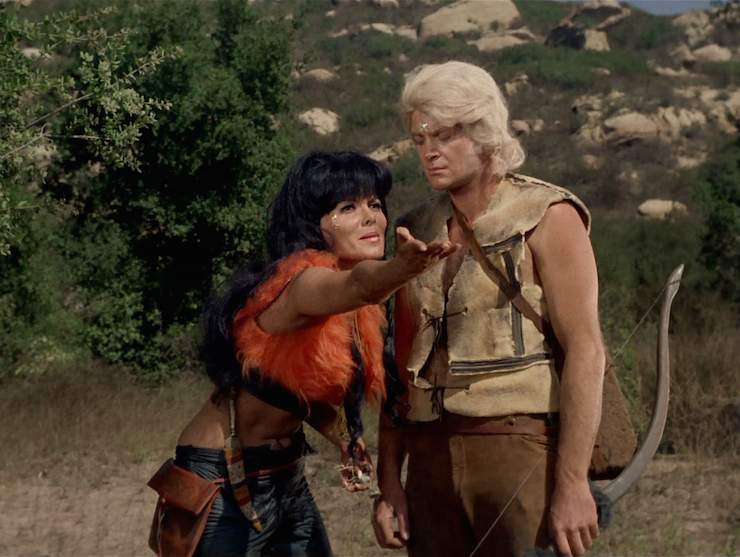
Their sweet passionate nookie-nookie is interrupted by one of the other hill people who tells them—well, tells her, Tyree is a bit distracted—about Kirk and McCoy.
Nona arrives to see McCoy phasering rocks. She then asks Tyree for everything he can tell her about Kirk—but he promised to be silent, and they became blood brothers. However, Nona is his wife, and she demands to know everything about Kirk, or her remedy for his poison won’t work.
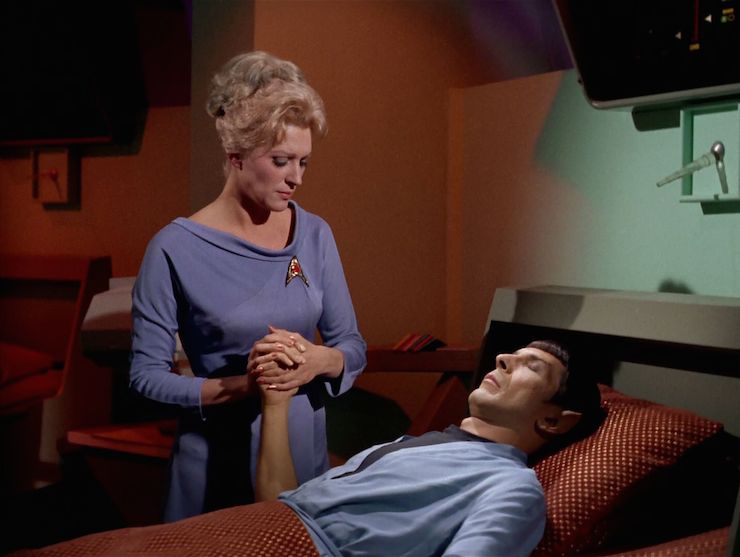
Chapel holds Spock’s hands while he’s in a healing trance. M’Benga informs her that he’s conscious, but all his mental energy is being focused on healing the damaged tissues, so he can’t communicate. When the readings start to fluctuate, M’Benga tells Spock (who can hear him, even if he can’t acknowledge) that someone will be with him at all times. He then tells Chapel to call him as soon as he wakes up, and also to do whatever he says to do immediately. As it turns out, what he asks is for her to hit him, and after initially refusing, she does so. Spock is cured! Hooray!
Nona uses a local root, her own blood, chants, and a ridiculous dance to cure Kirk. It seems to work, as Kirk wakes up long enough to say he’s tired and fall asleep. McCoy takes the root away and sees that there’s no sign of the bite—not even a scar. The cut on Nona’s hand is healed as well. According to Nona, they have shared blood and he is hers now. According to Tyree, legend says that a man can refuse a woman no wish after that particular ritual.
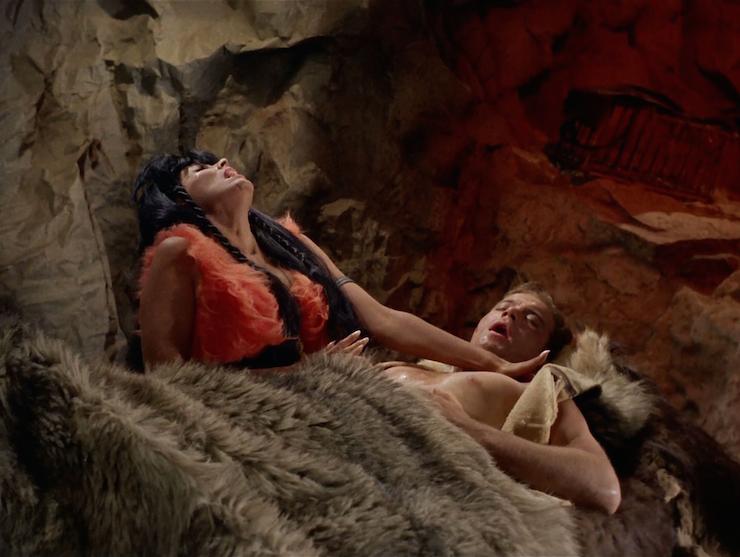
The next morning, everyone wakes up, and Tyree and Kirk have a happy reunion. Kirk had hoped that Tyree would find a kahn-ut-tu woman to cure him—Kirk is rather surprised to find out that he married one.
Tyree fills Kirk and McCoy in. The villagers have been making the firesticks for about a year now. Kirk wants to see them, but Nona wishes Kirk to give them phasers. But there’s a more fundamental issue: Tyree refuses to kill under any circumstances. Nona is furious—she thinks it is better to fight than to die.
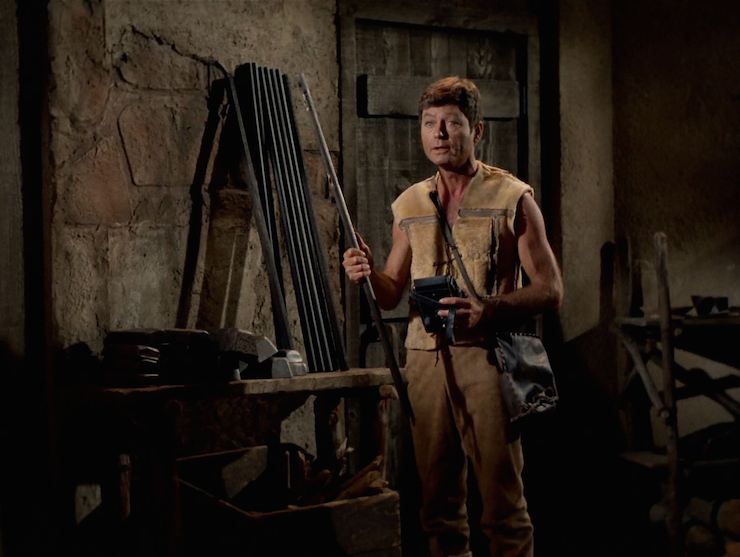
Tyree, Kirk, and McCoy sneak into the village. They subdue a guard, and Tyree takes a rifle with him. They find a forge, but also items that couldn’t possibly have been made there, including some industrially produced items.
Apella, the leader of the village, meets with a Klingon, Krell, who shows him a new “improvement” on the rifle, one that will mean fewer misfires, and he promises more improvements on his next visit. Krell brings Apella to the forge, where they find Kirk and McCoy. There’s a donnybrook, and the trio manage to escape the village, despite the locals firing on them.
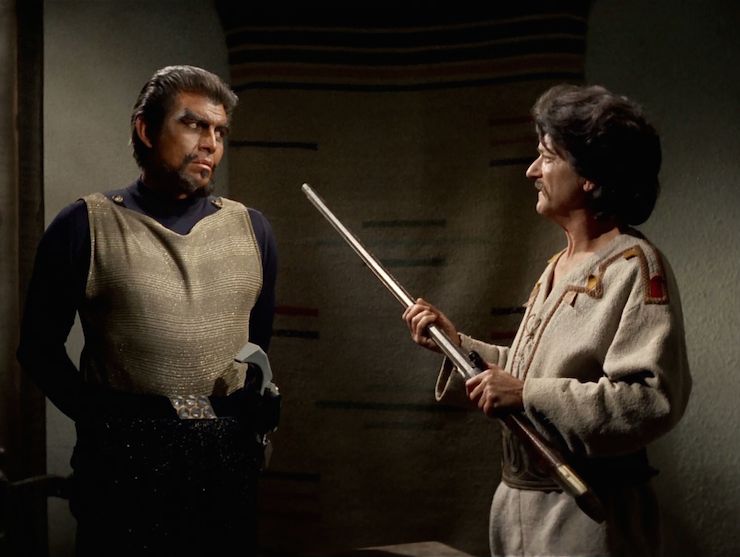
Kirk shows the hill people how to use the rifle they’ve confiscated. McCoy can’t believe he’s doing that, worrying that he’s doing what Nona wants, but Kirk says she wants superior weapons, he only wants to give them equal weapons, a balance of power. It’s the only way to preserve both sides. McCoy is justifiably concerned that this will just plunge the planet into an endless war.
Kirk is also concerned that Tyree won’t fight, so he goes to Nona, walking in on her after she’s taken a bath. She uses the love potion on him before he can even start to talk to her. Naturally, Tyree walks in on them right as they smooch. He comes very close to using the rifle on them, then realizes how easy the rifle makes it to kill the people he loves, and he leaves, casting the rifle aside.
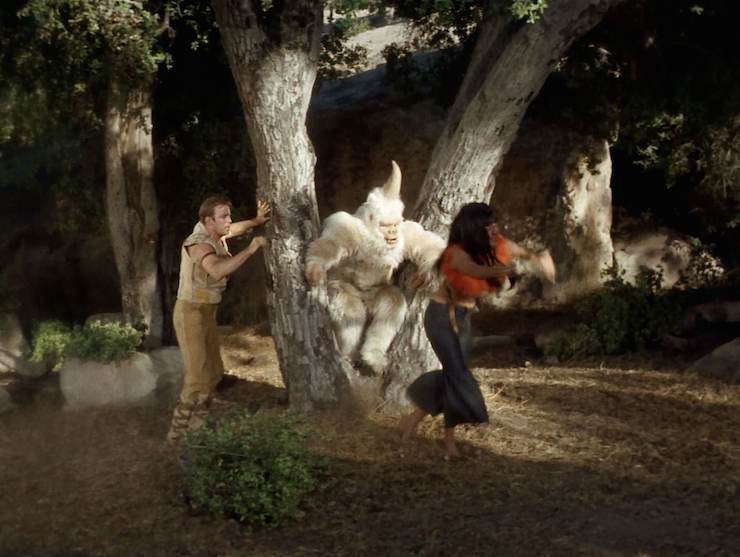
After Tyree leaves, the mugato attacks, but Kirk is too smitten to even notice. The mugato goes after Nona, and eventually Kirk regains his senses enough to phaser the mugato. But he’s still woozy, and so Nona clubs him with a rock and takes the phaser.
Tyree stomps angrily into the encampment, saying he left the rifle behind. McCoy points out that leaving such a weapon just lying around is a really bad idea, so he takes them back to find a woozy, phaser-less Kirk.
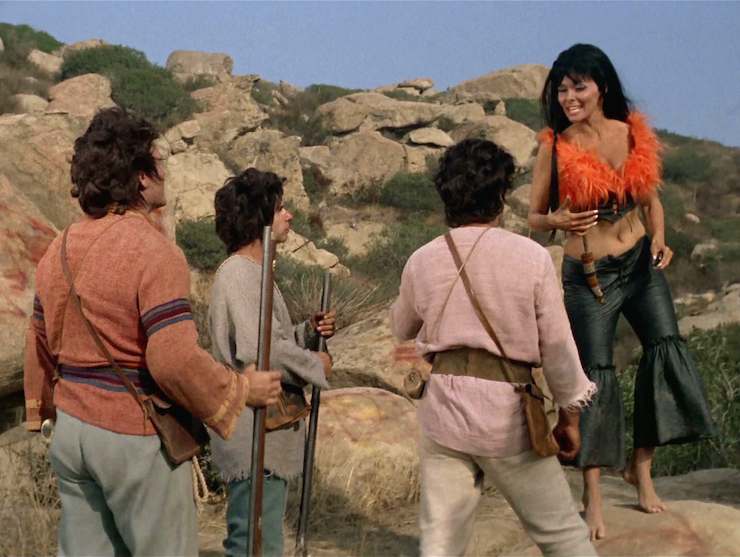
Nona finds four villagers, and offers to give them a phaser. All they see is a sexy kahn-ut-tu woman, and they try to gang-rape her. Tyree, Kirk, and McCoy see that, and the villagers assume it’s a trap and kill Nona. A massive fight breaks out, and Kirk has to stop Tyree from beating one villager to death with a rock, while McCoy is winged by a rifle shot.
Tyree is devastated by Nona’s death, and demands that Kirk give him more flintlocks. Tyree intends to kill all the villagers for what they did to his wife.
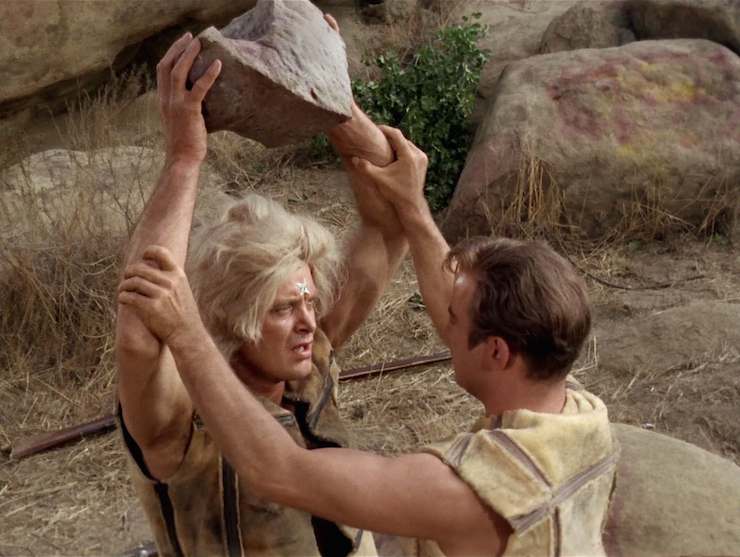
Kirk orders a beam-out, saying he’ll need Scotty to fashion some flintlocks—or, waxing poetic, serpents for the Garden of Eden.
Fascinating. Vulcans can heal themselves by putting themselves into a coma and focusing all their energy on the process. When they come out of it, they need to be slapped a lot. Either that, or Spock is just into that kind of thing…
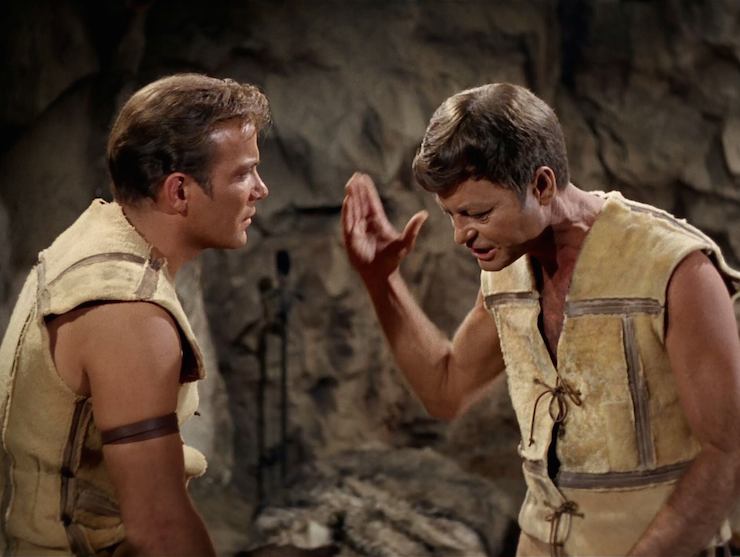
I’m a doctor not an escalator. McCoy gets to play Kirk’s conscience, and without Spock around, it’s basically all shouting. He also doesn’t check to see if anybody’s watching him phaser rocks, which pretty much leads to the entire episode’s conflict.
Hailing frequencies open. Uhura shows off, knowing the answer to how long it was between the development of the bow and arrow and the flintlock. She also eavesdrops on the Klingons to determine that they don’t know they’re there.
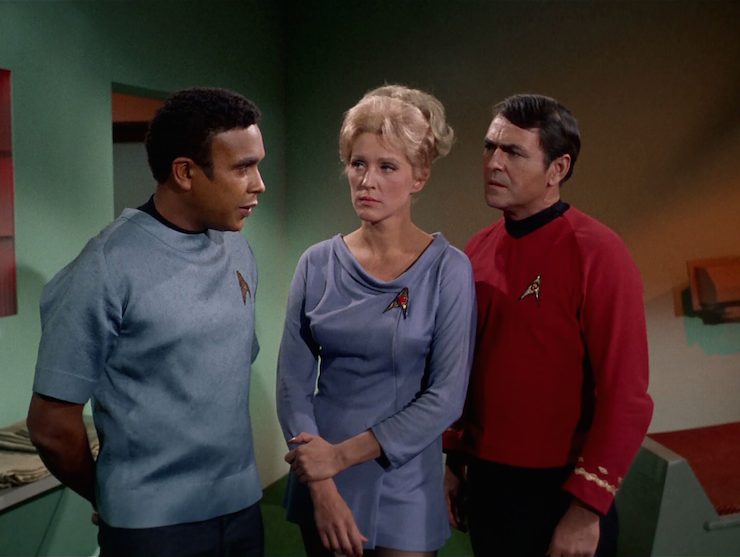
I cannot change the laws of physics! Scotty walks in on Chapel beating up the first officer, and yanks her off him. M’Benga comes in then and finishes the job of tenderizing Spock’s face while a confused Scotty looks on. Only after Spock fully wakes up does M’Benga explain what’s happening, and Scotty mostly just looks really really really confused.
It’s a Russian invention. Because Sulu isn’t in this one (George Takei was still filming The Green Berets), Chekov has to stand by the helm to say how they’re moving, since the helmsman is an extra who doesn’t have any lines.
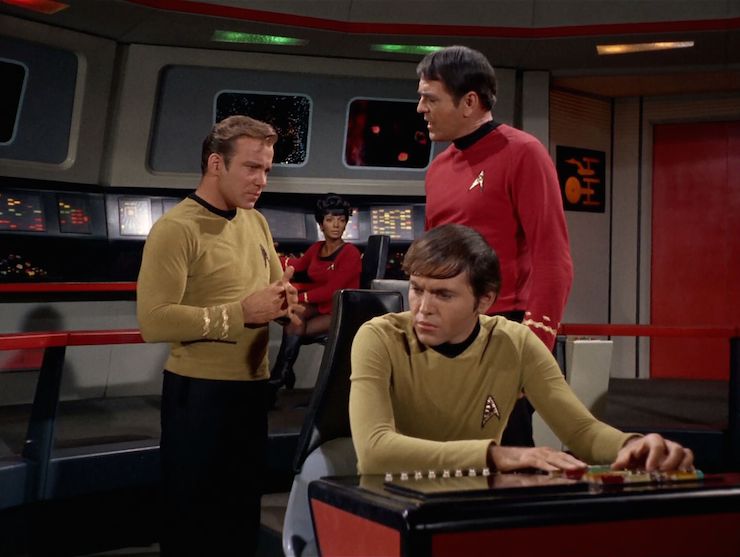
No sex, please, we’re Starfleet. Nona believes in seducing men via hallucinogenics, apparently not trusting her bare midriff, groovy eye shadow, and impressive cleavage to do the trick.
Channel open. “What are you doing, woman?”
Disappointingly, this is not something anyone says to Nona, but rather what Scotty says to Chapel when he sees her giving Spock a beat-down.
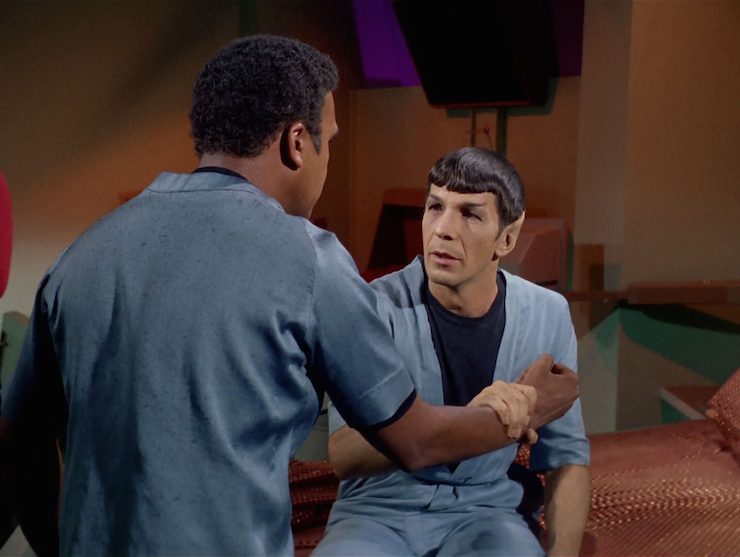
Welcome aboard. Ned Romero plays Krell—he’ll return to Trek on two of the spinoffs, playing Native characters in both TNG‘s “Journey’s End” and Voyager‘s “The Fight.” Michael Witney plays Tyree, Nancy Kovack plays Nona, and Arthur Bernard plays Apella.
Stuntman and animal impersonator Janos Prohaska plays the mugato, his only billed role, though he previously played a couple of the background aliens in “The Cage” and created the Horta for “The Devil in the Dark.” He’ll return in “The Savage Curtain” as Yarnek.
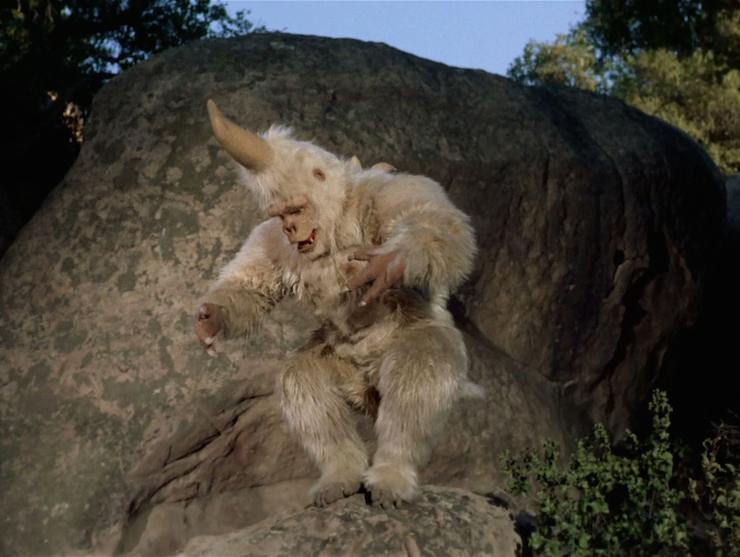
Booker Bradshaw debuts the role of M’Benga in this episode; he’ll reprise the role in “That Which Survives.” Also back are recurring regulars Majel Barrett, James Doohan, Nichelle Nichols, and Walter Koenig.
Trivial matters: The original story was by Don Ingalls, but he used the pseudonym “Jud Crucis” (a play on “judicium crucis” according to Ingalls in a Starlog interview) by way of objecting to Gene Roddenberry’s script.
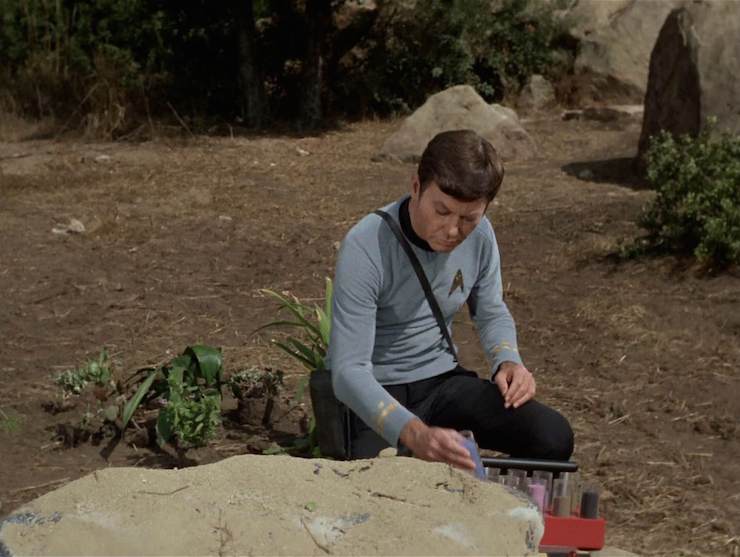
The mugato was called “gumato” in the script, but it was changed to accommodate DeForest Kelley’s complete inability to say “gumato” properly. The closing credits still say “gumato,” as does James Blish’s adaptation in Star Trek 10.
The names of both the planet (Neural) and the Klingon (Krell) come from the script; those names were never spoken aloud on screen. The treaty that the Klingons have violated is the Organian Peace Treaty, established in “The Trouble with Tribbles,” and which was signed following “Errand of Mercy.”
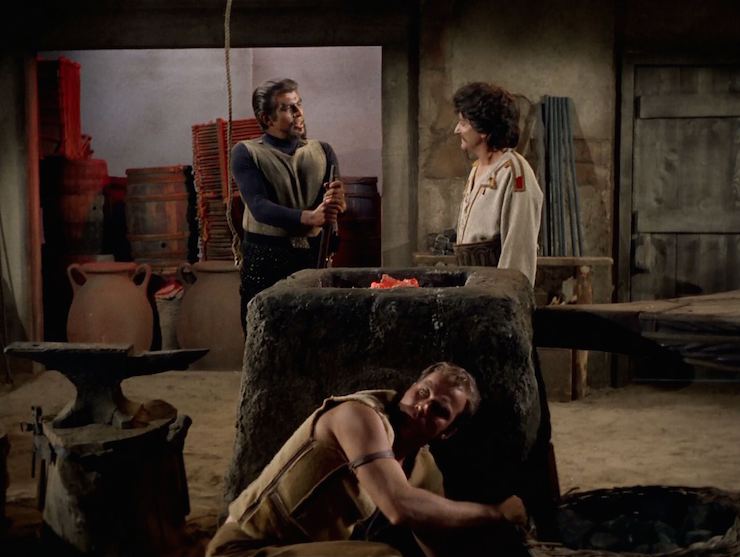
Jeff Mariotte wrote a novel sequel to this episode taking place shortly before The Motion Picture entitled Serpents in the Garden.
The events of this episode are shown from the Klingon perspective in the third issue of the IDW comics miniseries Blood Will Tell by Scott & David Tipton and David Messina.
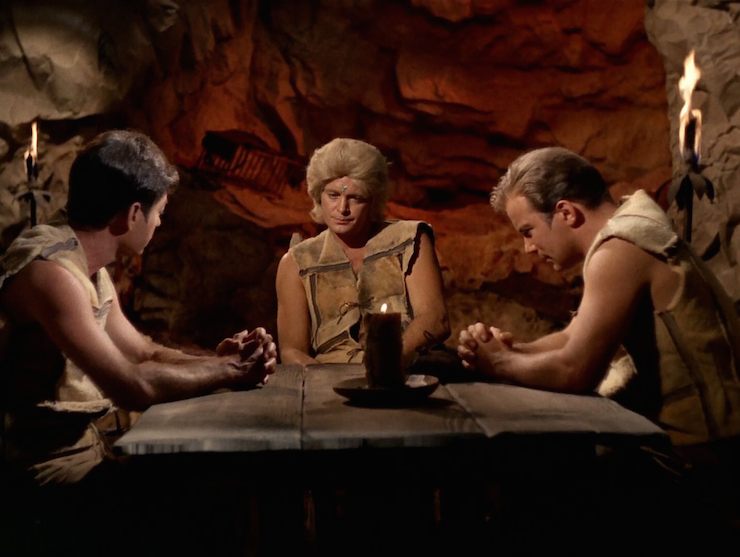
M’Benga will go on to appear in numerous pieces of tie-in fiction (with a variety of first names, including Geoffrey and Jabilo), most notably in The Vulcan Academy Murders and The IDIC Epidemic by Jean Lorrah, One Small Step by Susan Wright, The Lost Years by J.M. Dillard, Traitor Winds by L.A. Graf, Death’s Angel by Kathleen Sky, and the Vanguard novel series by David Mack, Dayton Ward, and Kevin Dilmore. Alternate universe versions of M’Benga also appeared in Mirror Universe: The Sorrows of Empire by Mack and The Tears of Eridanus by Michael Schuster & Steve Mollmann in Myriad Universes: Shattered Light.
To boldly go. “Touch me again, and this small box will kill you.” Allegedly, one of the objections Don Ingalls had to Gene Roddenberry’s script that led to his choosing a pseudonym was that his original had more overt Vietnam references. Reading that, I shudder at the notion that somewhere out there in the ether is a version of this story that’s even less subtle than the one that aired, which I wouldn’t have believed possible.
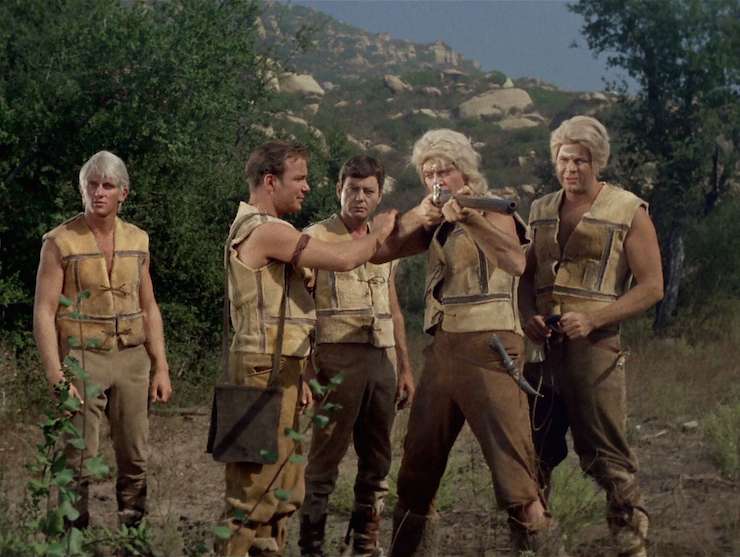
In the abstract, this has the potential to be a decent Vietnam allegory, with two larger powers messing around with a primitive planet. But the analogy doesn’t entirely work here, because Kirk’s solution makes absolutely no sense.
Actually, before we get to that: what the Klingons are doing makes no sense, either. The plan is obviously to annex Neural and make it part of the empire. Why are they doing it so slowly and subtly? If it’s to not draw attention—well, okay, but that ship has sailed once the Enterprise shows up. But what are they gaining by this action? Do they want to start a war that will wipe the people out so they can move in without resistance? If that’s the case, why something so primitive as flintlocks? What’s the endgame?
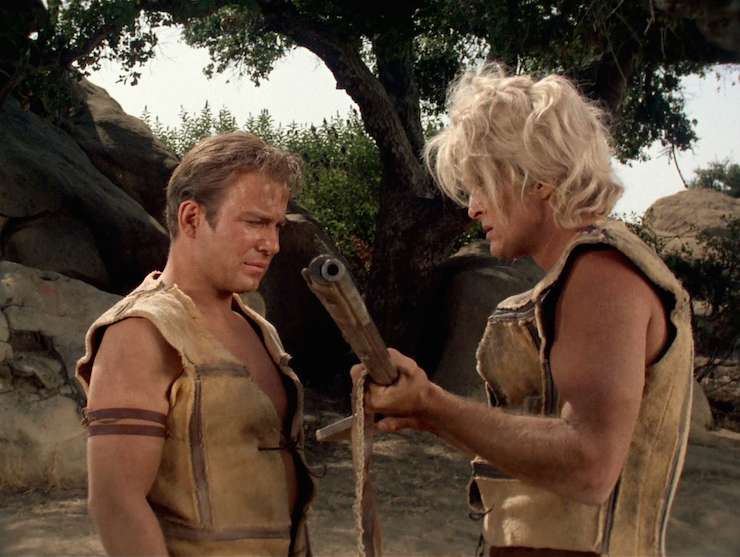
And now that the Enterprise has shown up, why is Kirk’s solution to arm Tyree’s people? They go on at great length about how the Klingons have violated the treaty, but you know what you do when a major power violates a treaty? You report it to your government. Sure, they can’t report to Starfleet right away because they don’t want the Klingons to know they’re there, but McCoy recorded everything in that forge. They now have evidence that the Klingons have broken the treaty. So instead of adding more guns to a situation that already has too many of them, which never ever makes it better, why not leave orbit and inform the admiralty, who will inform the Federation Council, who will call the Klingon Empire on their bullshit?
On top of that, we’ve got all the nonsense with the kahn-ut-tu women and Nona’s ridiculous healing gyrations. It’s not as bad as “Friday’s Child,” at least, but it’s still pretty offensive. Oh, and I love how the good people (Kirk’s friend, generally peaceful) have white hair and the bad people (enjoy killing, work with Klingons, gang-rape Nona) have black hair. Symbolism!
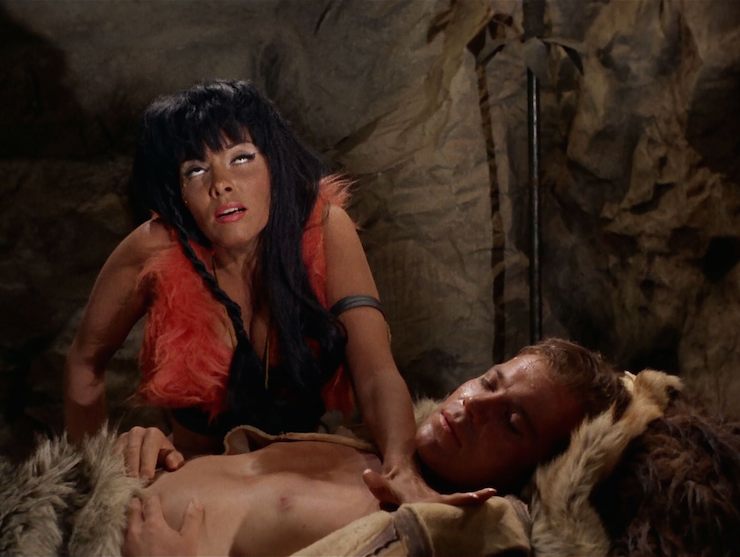
I was hoping to at least enjoy the mugato (I even have a little stuffed mugato on my desk), but man, does that creature not translate to HD well.
Warp factor rating: 3
Next week: “The Gamesters of Triskelion”
Keith R.A. DeCandido will be at Farpoint 2016 this weekend in Timonium, Maryland, alongside fellow Trek scribes David Gerrold, David Mack, Peter David, Michael Jan Friedman, Dave Galanter, Howard Weinstein, Robert Greenberger, Aaron Rosenberg, Glenn Hauman, Allyn Gibson, Richard C. White, and Steven H. Wilson; Klingon language creator Marc Okrand; actors Sean Maher and John Morton; and tons more. Keith will be doing panels, a practical self-defense workshop, autographings, a reading, and also performing with both Prometheus Radio Theatre (Friday night) and Boogie Knights (Saturday morning). His full schedule can be found here.










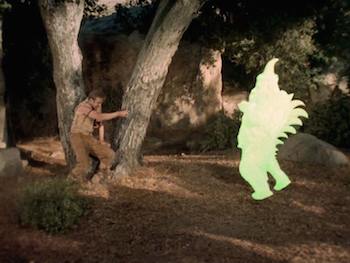
My takeaway from the “serpents for the garden of Eden” line was that Kirk had realized that he was not going to have Scotty make the muskets after all.
Of course, that leaves the conflict completely unresolved, but presumably at that point Kirk could take his complaints to the Organians or whoever mediates treaty disputes. And it kind of leaves Tyree in the lurch. But still better than actually beaming down rifles or muskets and people to train them to use it. It doesn’t really work as a Vietnam allegory unless Kirk doesn’t supply the hill people with guns.
Perhaps they want their allies to be so well armed that they can easily conquor the planet, but so badly armed they can easily be dominated by a small force of Klingons? So they give them weapons that are greatly superior to native weaponry, and greatly inferior to Klingon weaponry.
“the pseudonym “Jud Crucis” (a play on “Jesus, crucified”)”
That’s incorrect. As explained in the excellent Star Trek Fact Check blog:
“Ingalls himself offered a different explanation for the pseudonym in the pages of Starlog:
Here’s the actual Starlog piece. That should be judicium crucis, though. It means “judgment of the cross.”
My interpretation is this: The Organian Treaty forbids the Klingons from conquering the planet outright (I assume), so they need to get invited in. So they’re helping one local faction take over so they can have friends in charge. As for why Kirk arms the Hill People, he probably figures it would take a long time for the wheels of diplomacy to work, long enough that Tyree’s peaceful band would be slaughtered if they couldn’t defend themselves.
I’ve always found it interesting that the episode took such a morally ambiguous tack at the end, going more for tragedy and a situation with no easy answers than the usual straightforward win for the good guys. I question Kirk’s plan myself, to be sure, but it’s neat that they let him be flawed and make an imperfect decision. And it fits with his character. On various occasions in the past — notably Gene Coon’s “Arena” and “The Devil in the Dark” (and more recently in Into Darkness) — we’ve seen that Kirk’s first impulse was to think like a soldier, to go for the aggressive solution, and that he needed Spock’s counsel to hold him back and make him consider a more peaceful alternative. Here, Spock is taken out of the equation, so it follows that this time, Kirk isn’t held back from the more aggressive path.
Nona is sexy, but unfortunately caricatured — the scheming temptress, the primitive seductress using her mystical charms to confound the menfolk. It’s a trope that goes back to Orion Vina in “The Cage” and will be seen again with Elaan, but it’s developed the most fully here. There’s also the unfortunate ’60s trope of brownface casting. I was surprised to see Nancy Kovack in other roles and realize she was actually a rather pale blonde. (That includes the Man from UNCLE episode “The King of Diamonds Affair,” in which Kovack achieved the worst fake English accent I’ve ever heard.)
That’s how I saw it. The Klingons aren’t going to hand out boxes of disruptors. They’re going to give them something better that the hill people but something that would nit be as useful against them if the natives decide to revolt.
Based on the mention of the treaty, I assume that we’re looking at a planet that matches what Chekov says in Trouble with Tribbles:
CHEKOV: Under terms of the Organian Peace Treaty, one side or the other must prove it can develop the planet most efficiently.
The question is, what do the Organians consider efficiently? Do the villagers already have metal smelting? If so, perhaps the big change is gunpowder, not the flintlocks. “Hey, you guys can already make this, but look at what this stuff does. Combine the two and you’ve got a great new weapon.”. No mention of what happens if the planet is occupied so perhaps the Oregonians didn’t make a distinction. After all, they’re not really concerned with us mere mortals. They just want us to leave them alone. “Here’s a bunch of planets that are far enough away from us. Go play there and leave us alone.”
Which brings up the question, just how big is the neutral zone? In the FASA RPG, there’s actually two. One, governed by the Oregonian Treaty and the other just referred to as the Klingon Neutral Zone, presumably negotiated between the UFP and the Klingons. The Orion Neutrality Sphere separate the two.
Thanks for that little bit of pseudonym research, Christopher. Will edit forthwith…..
—Keith R.A. DeCandido
@3/Christopher: I wouldn’t say that Spock holds Kirk back in The Devil in the Dark. Spock tries to argue with him, but Kirk still orders to kill the creature. He changes his mind as soon as he meets it face-to-“face”, and it doesn’t immediately attack. My take on Kirk is that he thinks like a soldier in the abstract, but is actually such a nice guy that he tends to switch to a more humane solution as soon as he meets someone personally. Here he never gets to talk to any of the villagers, so he doesn’t come up with a better solution.
I never liked this episode but I never had the idea that arming the hill people could be meant as a temporary measure. Seen in this way, it makes much more sense.
And it introduces M’Benga. It’s nice to know that there are more people working in sickbay than just McCoy and Chapel.
We never learn why the Klingons are even interested in the planet, do we? At least in Friday’s Child we knew that it was about resources. And how can they hope to dominate the entire planet by having one small village conquer another one? They seem to make huge efforts for very small gains.
Wait a minute. Something I hadn’t noticed about this episode before: We can totally see Nona’s belly button throughout the episode! I thought that was a no-no (horrible pun intended) on TOS? Wasn’t Lee Meriwether’s costume in “That Which Survives” given that random little strip of cloth sticking up just so her belly button would be covered? I feel like there are other such costume examples but I’m blanking on it at the moment. But yeah….it seems like the censors gave this one a pass for some reason. Maybe they were like “ok, you can have one belly button episode, then you have to go back to covering it up.”
As ridiculous as it looks, I love the mugato. And now that Keith mentioned it, I really want to find myself a stuffed one, too!
So coincidentally, just this morning I watched the episode “The Way to Eden” in my own first time watch-through of TOS. What is it with TOS writers being obsessed with Garden of Eden analogies? You’ve got “The Way to Eden”, “A Private Little War”, “The Apple”….any others I’m forgetting?
@6/Jana: Don’t you know that most planets only have one or two populated villages/cities? :D
This episode got a sort of spiritual sequel in TNG’s “Too Short a Season” when it turns out another Starfleet Captain tried the same “arm both sides” thing in his youth. It ended in decades of genocide and war, which would have been a great episode to watch except this was Season 1 TNG so we got a dumb aging-backwards drug plot thrown in for good measure and followed that mostly instead. Oh well.
This episode is another that falls into the “it happened and it cannot unhappen” file for me. The horny gorilla was kind of fun though.
@6/Jana: I always figured the Klingons’ interest was strategic, that the planet’s location would let them gain a foothold near the Federation.
There’s a long history of nations fighting over territories that don’t seem all that significant. Look at the Falkland Islands conflict. Or Hamlet Act IV Sc. iv. “We go to gain a little patch of ground / That hath in it no profit but the name.”
For those wondering, here’s my desk mugato:
@10/krad: Nice! And it looks like Buddy Jesus approves of Mr. Mugato :D.
@7/Robert: There are belly buttons in Mirror, Mirror too.
Garden of Eden episodes: This Side of Paradise.
And you’re right about the number of cities on the average planet. Silly me!
Is this where Will Ferrell’s character name in Zoolander, Mugatu, came from?
@13/brightbetween – According to IMDb, yes. According to Wikipedia and MTV.com, Zoolander director Ben Stiller loves Star Trek.
…
Nona is one of my least favorite female characters in Star Trek. Basically no redeeming features there for me. Also, I am picturing De Kelley trying to pronounce “gumato” to rhyme with “tomato” …
Are you arguing that America’s solution in Vietnam (as of 1968) did make sense?
@3 – Chris: I like your analysis of why Kirk acted as he did.
@13, Not just the name but the character’s look. Just add a horn to him and you have a mugato.
I initially couldn’t hear the Vietnam metaphor over the Roofie-Plant.
I also assume “Gumato” is pronounced almost exactly like “Tomato.”
@2, 4: Stratigically, yeah, it’s probably either the Klingons handing out weapons a few thousand years out of date to give whoever they thought was most likely to take over the rest of the world (I’m assuming a similar conflict is playing out in other pairs of villages between these two peoples…) a more unified and militaristic way of running things, more in line with the Klingon’s own values, or using the conflict to keep locals busy and out of their hair while they mined or set up their base or whatever.
… From a writing standpoint I suspect the author was concentrating harder on Vietnam than sensible logistics or in-series continuity. :)
@15/Edgar Governo: I don’t know about everyone else, but I would argue that the episode fails as a Vietnam analogy. The circumstances are too different. No Organian Treaty, for a start…
Edgar: I’m arguing no such thing. But real life doesn’t have to make sense. Fiction kinda does. :)
—Keith R.A. DeCandido
I like the more subtle Klingons than the biker gang that they turned into on later shows. They’re not afraid to work with their captured or soon to be captured planets. It feels more like the kuve of The Final Reflection. They’re a resource for the empire and as such should not be simply slaughtered.
Kor was much the same. Sure, he ordered that hostages be rounded up but he didn’t execute them until Kirk forced his hand. The Oregonians had told Kirk that the Federation was not wanted and told Kir that they would not resist. Instead, Kirk went out and started a two man guerrilla war, brining the Oregonians into the war wether they wanted it or not. What did he expect the Oregonians to do against the Klingons when their only technology seemed to be self opening doors?
The Federation tends to think of the Klingons captured populations as slaves but the Klingon definition, kuve, means servitor. A minor distinction but a difference all the same.
That’s one reason I had trouble seeing Koloth as the bumpy headed Kling on DS9. The change wasn’t as great with Kang and Kor but the Kiloth seemed like an entirely new person with the same name and voice.
It’s harder to demonize someone when they refuse to live down to your propaganda. Perhaps some people simply prefer the Klingon way of life and the Federation can’t bring themselves to see that. Life on a Klingon kV world may be harsh but at least the Klingons aren’t trying to get you to fight their wars for them.
@18 Gum-ay-to, gum-ah-to, let’s call the whole thing off.
Unsubtle Vietnam analogy? Probably. But still, this is one of my all-time favorite TOS episodes, and it’s all thanks to that messy ending, both ambiguous and tragic.
If anything, I find Kirk’s actions make perfect sense and remain true to character. To me, Kirk is a soldier first and foremost. As Christopher pointed out, without Spock there’s no counterpoint to balance Kirk’s decisions. Of course he’s going to want to help Tyree. Of course he’s biased as hell in this conflict, making seriously flawed calls left and right. That’s what makes this episode so watchable. Should he have warned Starfleet HQ? Maybe, but then again the episode makes it clear that Kirk isn’t being remotely objective during this crisis.
Take out the Mugatu, rewrite Nona to be a little less of a sexist caricature, and you have a potential episode worth a 10, at least to me.
On the other hand, keep the Spock/Chapel slapping. It’s the unintentionally funniest scene in the season.
Maybe I’m missing something, but I don’t see Spock’s moderating influence on Kirk (nor, as a rule, that Kirk needs someone to have a moderating influence on him in order to behave decently).
In A Taste of Armageddon, Kirk stops the war on his own. In The Devil in the Dark, Spock wants to save the Horta, but only for scientific reasons; he changes his mind as soon as he fears for Kirk’s life. It’s Kirk who decides to talk to the Horta instead. In Errand of Mercy, Spock never questions Kirk’s course of action. In The City on the Edge of Forever, Kirk agrees with Edith Keeler’s pacifist world view. It’s Spock who points out that “she was right, but at the wrong time”. In Metamorphosis, it’s McCoy, not Spock, who reminds Kirk that he’s also trained to be a diplomat and suggests to try “a carrot instead of a stick”. In By Any Other Name, it’s Kirk who comes up with the idea to offer Rojan a planet to settle, even though he has not only hijacked the Enterprise, but also killed one of Kirk’s crewmembers.
The only episode I can think of where Spock may have had a moderating influence on Kirk is Arena, and even that is open to interpretation. When Kirk claims that the attack was an invasion, Spock tries to point out that there could be other explanations, but when Kirk interrupts him he doesn’t persist in his viewpoint. Instead he says: “If that’s the case, you must make certain that the alien vessel never reaches its home base.” So, when Kirk later decides not to kill the Gorn, does this have anything to do with Spock’s earlier objections? I think it’s merely Kirk being in character, i.e. being a nice person.
He tends to be more aggressive against Klingons (Errand of Mercy, Friday’s Child), but in these cases Spock doesn’t hold him back, but goes along with him.
(By the way, when I showed Arena to my sixteen-year-old daughter, who had already watched most of the other episodes I mentioned above, she fully expected Kirk to team up with the Gorn as soon as they were beamed to the planet by the Metrons, and was disappointed that they fought instead. So she wasn’t quite as impressed with the ending as I had imagined.)
@24/ JanaJansen
Cou;n’t have said it better! Good analysis.
I think both Devil In the Dark and Arena actually demonstrate Kirk’s way of thinking in generall. Faced with abstract situation, something killed/is killing people, he makes the general decision to retalitate – maybe it’s military way of thinking like others say, but the second he sees sentient opponent who can be reasoned with instead of this abstract enemy he is all for avoiding violence and searching for compromise.
I don’t remember his speech in Day of the Dove verbatim but the main idea was “we are soilders and we are taught to prevent the war, not to go fighting”, and that is consistent with what he usually does.
On Neural his decision was a mess, but I can’t say that it would have been any better if they simply left doing nothing at all. I rather doubt it… But I don’t know what would have been the right way.
Hey folks! Because of a rather exhausting Farpoint 2016 this past weekend, I needed some extra recovery time, so the rewatch of “The Gamesters of Triskelion” won’t go up until tomorrow.
—Keith R.A. DeCandido
@26: Now there’s a truly forgettable episode. Saw it recently. Looking forward to what you have to say about it.
@3 I think it’s rather perverse to present a pro Vietnam war allegory as an oh-so-difficult choice the USA (starfleet) has to do. But it’s the white man’s burden, you know? You just have to help the good natives and fight the bad.
@19 The Organian treaty is a stand-in for the nuclear weapons. USA and USSR couldn’t fight each other directly due to the risk of a nuclear war and the Federation and the Klingons can’t fight it out because the Organians might intervene. In order to make this parallel clear the series even established one of the rare cross references by referring to the Organians again here and risking to confuse audiences who hadn’t seen the episode in question.
This is one of the first episodes where a genuine trash feeling creeps in. Not only are the wigs silly and as krad mentioned mindnumbingly obvious, but Nona is a positive nightmare. There’s lots of whining in the comments here whenever a sentence slips out which betrays 60s attitudes towards women even when it’s rather uniportant to the story. But Nona in her garish outfit and makeup and her slutty and evil behaviour makes this episode a pain to watch including the “just” punishment the writers devised for her including a little gangrape.
So due to its problematic political implications as well as to the trashy elements this is a rather embarassing episode which however will be easily surpassed in awfulness by the next which is an absolute nadir of the series.
@28/Lubitsch:
That’s what it’s supposed to be, but I don’t think that it works here. The whole analogy doesn’t work. For one, Kirk and McCoy collect evidence in the village that the Klingons breached the treaty, but we never learn whom they want to show it. Their government? The Klingon government? The Organians? Is there someone out there who could stop the Klingons if they knew about their activities? If there is, the analogy doesn’t work. If there isn’t, what good will collecting evidence do? It seemed to me that they expect a diplomatic solution to work, but then they forget all about it, so we never learn what it’ll be.
Then, the background stories are vastly different. In this episode, we have a peaceful society before the Klingons come along and make trouble. (So the solution might have been to talk to the villagers, but nobody ever thinks of that.) In contrast, the past history of the Vietnam war consists almost entirely of war – getting rid of the French colonists, Japanese occupation during the Second World War, division of the country. It was about outside forces meddling in a civil war that came about because of other outside forces meddling in the past, not about a peaceful society suddenly made aggressive by one meddling outside force. Not the same story at all.
Next, Kirk merely wants to help the weird wig wearer of the week and his people, however misguided the help may be. It’s not about interstellar politics or the fear that the Klingons might become too powerful or too attractive to weaker societies. No domino theory analogue.
Anyway, I agree that this is an embarrassing episode. It’s a real shame after all those great anti-war stories in the first season. But unlike you, I like the interpretation presented in comment #3, because it saves this story from an in-universe point of view. (Another benevolent interpretation could be that Kirk actually was under Nona’s influence when he made that stupid decision, but was able to resist partially and thus gave his friend only flintlocks instead of phasers.)
Hmm, maybe I should really not re-watch Gamesters of Triskelion afer reading comments @@@@@ 27 and 28. I have fond memories of it, but maybe that’s only because my love for that one line by Spock(“Constant exposure does lead to a certain degree of…contamination.”). All-time most quoted line in my family growing up, could be used for almost any circumstance. I have very little recollection of the episode itself though, so looking forward to that recap today(no worries, Keith, slack is always cut for you. Enjoy your commentary oh so much, even though I almost never find time to comment!! Your thoughts are always very insightful and intriguing.)
Thanks, Sonofthunder. You should be aware that, ah, I am not kind to the episode….
—Keith R.A. DeCandido
Noted. (Still looking forward to reading, although may postpone the actual re-watch!)
Another difference between this and the Vietnam war is the leadership. South Vietnam’s leader was a dictator who did not care about their own people and therefor a lot of the South Vietnamese had no real incentive to fight. Tyree, at least from what I’ve seen DOES seem to care about his people and their way of life. While NOT the only factor stuff like that does make a difference.
Actually, it’s in “The Savage Curtain” that he plays Yarnek.
Clay: geez, did I do that? Derp.
—Keith R.A. DeCandido, always grateful for the edit function….
Kirk badly screws up here. I don’t see any evidence that he sees this as a temporary solution. His rather jingoistic references to “our side” and speech about a balance of power and potentially providing the hill people with even more advanced references if they need them indicate that he sees this the same way the United States government saw Vietnam: As a proxy war, with the Federation supporting one side and the Klingons supporting the other. He doesn’t seem to want to end the war but prolong it, meaning that, while he seems to be motivated at least partly by helping his friend, he’s basically using the hill people as cannon fodder to stop the Klingons getting the planet.
The scene where McCoy rightly objects to Kirk becoming an arms dealer and then backs down because he can’t think of an alternative is a massive cop-out: There are a dozen better solutions, including the one Keith gives in the review. Kirk spends ages getting proof that the Klingons are involved then doesn’t do anything with the proof. If the Prime Directive doesn’t count today, why not beam down a squad of security guards, stun the villagers, remove all the weapons and set up a blockade to stop the Klingons delivering more? Or even stun them from orbit like they do in “A Piece of the Action” if you want to avoid exposing them to too much of the outside universe?
Nice as it is that Chris Bennett managed to retcon a way for Kirk to pat himself on the back and tell himself he did the right thing, I think the outcome that Peter David postulated (in Once Burned, I think) – that the Federation were outraged at Kirk’s actions and branded him a warmonger, resulting in Starfleet withdrawing their support, the villagers wiping out the hill people and then themselves, and the Klingons occupying the planet unopposed – is a lot more appropriate to the way things are left here.
@36/cap-mjb: I have no idea what you mean when you claim I “retconned” anything — that’s a misuse of the word, because I didn’t establish anything about the facts of the episode that wasn’t already there. And I’m absolutely not saying that Kirk thought he “did the right thing” — nothing could be further from the truth. It’s obvious that the whole point of the episode’s ending was that there was no pat, easy right answer, nothing to do but choose the lesser of two evils. The best Kirk could manage was to keep the Hill People from being exterminated, even at the cost of destroying their innocence. It’s certainly not true that he “wanted” to prolong the war — the point is that he felt he had no choice, that a bad option was the only option he had. It was obviously supposed to be a tragic ending.
I mean, is that so hard to grasp? Kirk did plenty of things in TOS that he didn’t want to do — killing Gary Mitchell, keeping Janice Rand at arm’s length, letting Edith Keeler die, etc. Drama is often about characters having to do things they don’t want because circumstances or duty leave them no other choice.
37. ChristopherLBennett – And if Tyree asked for phasers instead of flintlocks? As long as Kirk wan’t forcing them to accept them, wouldn’t that fall under your definition of the PD? The Klingons didn’t seem to be forcing the villagers to accept the primitive weapons but that’s probably because they didn’t want to arm them with something that could be turned against them.
This episode is also an interesting look at how the Klingons deal with less advanced cultures.
37/ChristopherLBennett: I apologise for my slightly aggressive tone, especially since I realise my comment was misdirected: I’d somehow got it into my head that you wrote Serpents in the Garden, yet digging out my copy I realise that that was Jeff Mariotte. The novel does, in my opinion, retcon the events of the episode to give it a neat happy ending and have Kirk muse “He believed he’d been right to supply the Hill People with weapons…the flintlocks provided had probably saved lives, kept the Freeholders safe until his return.”
That said, I do feel the need to revisit the dialogue from the episode:
McCoy: Furnishing them firearms is certainly not the answer.
Kirk: Bones, do you remember the twentieth century brush wars on the Asian continent? Two giant powers involved, much like the Klingons and ourselves. Neither side felt could pull out.
McCoy: Yes, I remember. It went on bloody year after bloody year.
Kirk: What would you have suggested, that one side arm its friends with an overpowering weapon? Mankind would never have lived to travel space if they had. No. The only solution is what happened back then. Balance of power.
McCoy: And if the Klingons give their side even more?
Kirk: Then we arm our side with exactly that much more. A balance of power. The trickiest, most difficult, dirtiest game of them all, but the only one that preserves both sides.
To which any sane person would reply “Are you out of your mind?” For a start, the argument doesn’t even make sense: It was one side having an overpowering weapon that ended the Second World War. But yes, it does seem from that that Kirk does want to prolong the war indefinitely, with no other solution and no end in sight. And it doesn’t feel like the episode has escalated to that point, that it’s become so caught up in defending the American foreign policy of the time that it’s forgotten it’s an episode of Star Trek where its heroes are supposed to be better than that. It seems like the episode starts off playing by the rules, presenting Kirk as a detective rather than a military adviser, planning to expose and defeat the Klingons’ plans, but then that gets in the way of the allegory so the evidence they’ve gathered gets forgotten and it becomes the story of the Communists/Klingons stirring up a war against the peaceful natives (accurate or not, it’s how pro-Vietnam supporters saw the situation…and it makes you wonder abouty the Klingons suddenly being Asiatic again after a couple of episodes of looking like Europeans) and the forces of democracy having to give the downtrodden side led by a benevolent dictator a leg up. It’s a dirty job but we’ve got to do it, the end seems to say…except they don’t have to do it, there are other options, options Kirk doesn’t seem to explore or consider. This is the only episode of TOS that had me staring at the screen in puzzlement at the end going “Is that it?” There’s no ending, no resolution, it just kind of stops once it’s made its highly dubious message. Kirk makes a stupid emotional decision because he wants to save his friend and the episode tries to convince us it was the least worst choice available to him. But it doesn’t work.
@39/cap-mjb: I’ve never actually gotten around to reading Serpents in the Garden, so I can’t comment on that.
“For a start, the argument doesn’t even make sense: It was one side having an overpowering weapon that ended the Second World War.”
First off, Kirk wasn’t talking about WWII, he was talking about the subsequent era of proxy conflicts like Vietnam. And that era happened because both sides had nuclear weapons, a balance of terror that ensured neither side would strike first, so that they only went after each other indirectly by backing sides in the smaller “brush wars.”
Second, that’s not actually what ended WWII in Asia — that’s a myth that it was convenient to propagate. The fact was, most of Japan’s cities had already been destroyed by conventional firebombing by August 1945 — some with higher death tolls than the immediate losses at Hiroshima or Nagasaki (discounting later radiation fatalities/cancers/etc.) — and its government had already resolved not to surrender no matter how many cities were destroyed. They barely reacted to the Hiroshima bombing, and their meeting to begin discussing surrender happened hours before Nagasaki was bombed. What actually caused the surrender was the Soviets’ declaration of war against Japan the day before. Japan had planned either to negotiate better surrender terms using the USSR as a go-between, or to make the Allies’ invasion so costly that Japan could demand better surrender terms. The USSR going to war with Japan removed both those options, leaving unconditional surrender their only way to minimize further losses. The Japanese government and military just pretended it was because of the atom bomb to save face, claiming they surrendered to protect their people from an overwhelming, game-changing weapon.
@40/ChristopherLBennett:
Okay, I fail history, but that was just me being flippant. It doesn’t matter if Kirk’s providing the hill people with flintlocks or atom bombs, it’s not the answer. It’s not even a bad answer. And the episode struggles to make it clear exactly what Kirk’s trying to achieve. Is he really trying to keep both sides alive, as his comments suggest? Is he trying to fight the Klingons by proxy? Is he trying to help his friend? Because the solution he comes up with isn’t viable in the Star Trek universe. He seems to be intending a long-term involvement from the Federation, constantly monitoring the situation and providing the hill people with the materials they need, yet we know next week he’ll be warping off somewhere else and this planet will be forgotten. Which means his next report to Starfleet will have to read “Went to planet. Found the Klingons had started a war. Promised them some guns. Please supply.” At which point you’d expect any Star Trek admiral who isn’t working for Section 31 to fire him on the spot. His solution seems to be replacing a quick slaughter from an overwhelming enemy with a slow and nasty death as a result of years of internecine conflict. Never mind that, given the size of the two groups, a casualty rate on a par with Vietnam will see them all dead in a few months anyway. No talk of a diplomatic solution, no talk of ending the arms shipments, instead he just throws some more guns into the mix and sits around solemnly waiting for the producer’s credit to come up.
You all have missed the mark the story is what if Nona broke free and ran off, would she go back to her people,tryee was madly in love would he go after her, would she wish Kirk back and force him to take her to the ship as his wife,what happens if Nona never died?
Ugh, “A Private Little War” is always painful when I come to it during rewatches. I find it incredibly boring. If it wasn’t for Dr. M’Benga and the Spock slapping scene, I’d probably end up skipping it altogether. The only thing I dislike about the scene is Scotty’s use of the antiquated term, “Woman.” But his tone and physical reaction to Chapel beating the crud out of Spock is awesome! When M’Benga comes in and continues the “beatdown”, Scotty’s bemused look is comedy gold.
One other thing I have to praise is Kirk’s reaction to the Magatu poisoning. I think it’s one of the best acted scenes of poisoning I’ve ever seen. When Kirk starts shivering, I can almost feel the poison…
I enjoyed exactly three things here: Shatner’s acting when poisoned, Nona when she’s not treacherous for… misogyny reasons and the mutato since it was on the cover the reissue of The Monsters of Star Trek I used to read. Everything else here stinks.
Ah yes, the days before duck blinds, when they simply beam down in uniform, call attention to themselves, retreat, then return attired as natives except for the hair.
Am I missing something because it seems to me the hill people never got any flintlocks from Kirk or the Enterprise as he ends the episode with the comment beam down 100 serpents for the garden of Eden. The only flintlocks I ever see them get are the ones they took from the villagers. Also, how do the Klingons even know what a flintlock is? Are we to assume that they also developed chemically propelled projectile weapons? Another thing I found interesting is Nona addresses Kirk when they first meet as captain even though she couldn’t have gotten that information from Tyree considering Tyree probably didn’t know Kirk was the captain of a starship. Also in the ending Nona appears to be betraying Tyree by offering by Apella the phaser. I’m surprised no one commented on that. I also have a problem with the fact that there was no attempt to stun the mugato instead of vaporizing them.
@47/xyon921: “Am I missing something because it seems to me the hill people never got any flintlocks from Kirk or the Enterprise as he ends the episode with the comment beam down 100 serpents for the garden of Eden.”
It’s a metaphor. He does order 100 flintlocks beamed down, then when Scotty asks for clarification, he likens them to the serpent in Eden — the entity that brought the knowledge of evil to the innocents in the garden, destroying their idyllic world forever.
“Also, how do the Klingons even know what a flintlock is? Are we to assume that they also developed chemically propelled projectile weapons?”
Naturally. They didn’t go right from stone axes to disruptor pistols overnight. Presumably they went through the same history of weapon development that humans did. Scotty claimed in the episode that “a flintlock would be the first firearm the inhabitants would normally develop,” presumably because it’s the simplest type of firing mechanism. (Although that’s incorrect, as it was a refinement of earlier firing methods like the matchlock and wheellock, and manual ignition before those.)
Besides, TOS routinely assumed that alien cultures’ histories developed in parallel to Earth’s, with essentially the same designs to their architecture and tools and weapons and clothes, so that the production could reuse historical costumes and props rather than having to spend money creating alien paraphernalia every week.
“Another thing I found interesting is Nona addresses Kirk when they first meet as captain even though she couldn’t have gotten that information from Tyree considering Tyree probably didn’t know Kirk was the captain of a starship.”
Kirk had revealed his true identity to Tyree on his first survey years earlier. Presumably McCoy mentioned his captaincy to Tyree sometime before Kirk awoke.
“Also in the ending Nona appears to be betraying Tyree by offering by Apella the phaser. I’m surprised no one commented on that.”
It’s obvious enough, isn’t it?
OK I get some of those things can be easily explained away makes more sense when you put it that way. I had always assumed that he never went through with beaming down the muskets. You are right about the evolution of firearms by the way. I do like how Krell let’s Apella know that more improvements could be made to the musket including rifling etc.
Even as a high-schooler in the late 1970s, this episode’s ending left me cold. The ending makes little sense. Kirk analogizes the 100 flintlocks he ordered from Scotty to the serpent in the Garden of Eden. This is just not right. The serpent in the Garden of Eden tempted the totally amoral Adam and Eve into eating the fruit of the Tree of the Knowledge of Good and Evil. Once Adam and Eve partook of the fruit of that tree, their eyes were opened, and they knew good and evil. The hill people and the village people were not amoral before Kirk and the Klingons showed up at their planet. Both knew right from wrong. Bad, bad, bad ending . , , ,
@50/Paladin: It’s a metaphor — they’re not supposed to be absolutely exact. Gaining knowledge meant Adam and Eve no longer had the innocence of animals and had to bear the responsibility and pain that come with knowledge and civilization. By analogy, giving the “pure, innocent” natives weapons technology was the end of their innocence, the beginning of their age of armed warfare — hence, the knowledge of evil. And Kirk, along with the Klingons, was the one giving it to them, like the serpent.
I’ve never understood why, when they declare a planet to fall under the Prime Directive, they don’t leave some satellites to warn Starfleet of any ships in the area. It’s like Starfleet isn’t actually going to do anything to prevent “contamination” but instead simply leave it to “correcting” it years after the fact. For all we know, the Klingons moved in right after Kirk’s first visit. Sure, they say that the first flintlocks showed up about a year ago but that doesn’t mean the Klingons weren’t there earlier.
It’s interesting how present day geopolitical structure can certainly change the interpretation of an event. Taken as a metaphor for Vietnam at the time period, Kirk’s actions were something the audience was meant to have ambivalent feelings about. By the time the plot was meant to be revisited in “Too Short A Season”, the TNG staff looked at the actions of Kirk with disgust and considered it akin to Iran-Contra and something that made a mockery of the ideals of the Federation.
Now? Now, we’re currently in a situation where a much-smaller country is being armed by democratic forces against a much-larger anti-democratic aggressor and there’s very few people who consider it to be an immoral action.
I’m inclined to also believe the Klingons are within the “letter” of the law, whatever the Organian treaty says, because proxy wars are a historical way to get around this sort of thing. The treaty exists to keep the Federation and Klingons from exterminating each other. Nothing happening on Neural threatens large scale galactic destruction.
@53/C.T. Phipps: “The treaty exists to keep the Federation and Klingons from exterminating each other.”
Well, technically it exists to keep the Federation and Klingons from annoying the Organians by fighting over their planet. It’s basically the cosmic superbeing equivalent of “Hey, you noisy kids, stay off our lawn!” The fact that the Organians never intervened again proves that they couldn’t care less what the Federation and Klingons do to each other as long as they do it somewhere else.
I was really struck by how violent this episode was compared to the rest of the series (at least up to this point, unless I’m forgetting something). Spock gets shot in the chest, Kirk gets mauled, Nona narrowly avoids getting mauled, two creatures get vaporized, there’s a minor brawl with the bad guys, Spock gets slapped repeatedly by two medical professionals, Nona gets sexually assaulted by a group of men, McCoy gets shot in the arm, Nona gets stabbed in the chest, and there’s a much bigger brawl in which Tyree crushes a man’s head with a giant rock.
Amusingly, though Nona clearly smashed Kirk over the head with a rock, they shied away from showing it. I guess showing a woman committing that level of violence was a bridge too far.
@@@@@ 54 – “The fact that the Organians never intervened again proves that they couldn’t care less what the Federation and Klingons do to each other as long as they do it somewhere else.”
That’s like saying that Pike and company didn’t have any further adventures since we saw Pike twice and the rest of them not at all. There’s plenty of time that we know next to nothing about that the Oregonians could have shown up again. Between the end of TOS and the beginning of TNG, we had only 6 movies, three of which occurred in a matter of months.
Maybe one day we’ll get a “The Lost Years” series on TV.